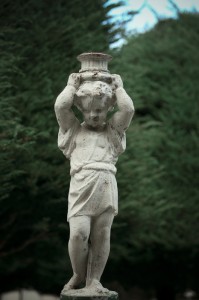by CJ Verburg
 Almost every time someone famous dies unexpectedly, someone else labels that death a tragedy. Philip Seymour Hoffman’s death last Saturday night was a tragedy, in the Greek sense: not just unexpected, but perversely made inevitable by his own choices. Among other things, it has unleashed a good deal of muttering about “that deep dark lonely place” which is said–usually by non-artists–to be the wellspring of creativity.
Almost every time someone famous dies unexpectedly, someone else labels that death a tragedy. Philip Seymour Hoffman’s death last Saturday night was a tragedy, in the Greek sense: not just unexpected, but perversely made inevitable by his own choices. Among other things, it has unleashed a good deal of muttering about “that deep dark lonely place” which is said–usually by non-artists–to be the wellspring of creativity.
The deep dark lonely place popped up again at a recent online publishing hangout. The speaker was talking of the “community” of writers from which 21st-century books emerge. In contrast to what I used to call the John School, i.e., the postwar literary circle comprising successful writers from Barth and Cheever to O’Hara and Updike, the present school is school-less. The Johns gave us shelves full of novels about sex, love, competition, and alienation in academia, because academia was where they lived–a prime source of their income, prestige, and visibility.
Just as the internet has shaken publishing companies out of their old niche, it has shaken out the academic community of writers.
Of course, “community” is used nowadays to mean any diverse group which the speaker wishes to treat as if it were monolithic: the gay community, the black community, the community of nations. Somewhere a pundit is probably commentating even now about the Facebook community, the Twitter community, the Pinterest or Reddit or Wattpad community.
 Just as the real-estate community redefined the word “home” to mean what used to be called a house, the word “community” is wielded as a kind of demographic comfort food. In our hearts, we all want a home. We all want to belong to a community. Our need for achievement seesaws with our need for affiliation.
Just as the real-estate community redefined the word “home” to mean what used to be called a house, the word “community” is wielded as a kind of demographic comfort food. In our hearts, we all want a home. We all want to belong to a community. Our need for achievement seesaws with our need for affiliation.
Think of any online group you’re active in. How community-like does it feel to you? Would these folks invite you over for a cup of coffee? Drive you to the hospital in an emergency? If the NSA (which sees all and knows all) accused one of them of a crime–say, murder or terrorism–would you leap to his/her defense?
When an actor performs in a play, he places himself in the hands of the other actors onstage. Like a trapeze artist, he trusts that when he jumps, he won’t fall to his death; someone will catch him. That is the place where art comes from. Call it community; call it home. It is not deep, dark, and lonely. Art happens in the safe place where you are free to do your best work.
 When I write, the fictional characters I create become a community. I know I’m inventing it, the same way I used to invent a family for my dolls. Still, whether I’m writing a play or a novel, I’m in a place that gives me immense emotional satisfaction (punctuated with hair-tearing frustration) as long as I’m fully immersed. Coming out is a jolt: What’s all this, then?
When I write, the fictional characters I create become a community. I know I’m inventing it, the same way I used to invent a family for my dolls. Still, whether I’m writing a play or a novel, I’m in a place that gives me immense emotional satisfaction (punctuated with hair-tearing frustration) as long as I’m fully immersed. Coming out is a jolt: What’s all this, then?
Years ago I taped up a twisted Beatles line over my typewriter: When I write, everything seems to be home.
Why does writing, or performing or directing, or painting, or designing a book cover, feel like home? I don’t know for sure. I know that, like my dollhouse, this mini-world is more manageable than the big one outside. The people in it may be charming, irritating, or frightening; they’re rarely boring. And although they are full of surprises and demands, they never seriously threaten me. Here, I’m the NSA: I see all and know all.
Art is escape. Oasis. Sanctuary. It’s reality that’s a deep dark lonely place.
